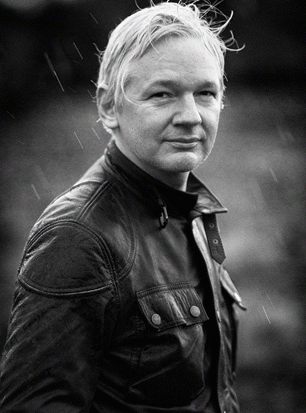| Back OpEd News | |||||||
|
Original Content at https://www.opednews.com/articles/Assange-asks-Ecuador-for-a-by-Glenn-Greenwald-120619-605.html (Note: You can view every article as one long page if you sign up as an Advocate Member, or higher). |
|||||||
June 19, 2012
Assange asks Ecuador for asylum
By Glenn Greenwald
Assange's resolve to avoid extradition to Sweden has nothing to do with a reluctance to face possible sex assault charges there. His concern all along has been that once he's in Swedish custody, he will far more easily be extradited to the U.S.
::::::::
The WikiLeaks founder is motivated by one thing: a desire to avoid extradition to the U.S. Can anyone blame him?
Julian Assange was scheduled within days to turn himself over to British authorities for extradition to Sweden, where he is wanted for questioning in connection with a sexual assault case in which he has never been charged. Instead, Assange earlier today went to the Embassy of Ecuador in London and sought asylum from that country under the Universal Declaration of Human Rights. The Ecuadorian Foreign Minister, Ricardo Patino, issued a statement indicating that his government is "evaluating the request" and that Assange will remain under protection at the Embassy pending a decision.
Ecuador may seem like a random choice but it's actually quite rational. In 2010, a top official from that country offered Assange residency (though the Ecuadorian President backtracked after controversy ensued). Earlier this month, Assange interviewed that nation's left-wing President, Rafael Correa, for his television program on RT. Among other things, Correa praised the transparency brought about by WikiLeaks' release of diplomatic cables as being beneficial for Ecuador ("We have nothing to hide. If anything, the WikiLeaks [releases] have made us stronger"). President Correa also was quite critical of the U.S., explaining the reason he closed the American base in his country this way: "Would you accept a foreign military base in your country? It's so simple, as I said that at the time, there is no problem in having a U.S. military base in Ecuador but ok, perfect -- we can give permission for the intelligence base only if they allow us to install an Ecuadorian base in the United States, a military base. That's it, no more problem."
Assange has been fighting extradition to Sweden for a year-and-a-half now, during which time he has been under house arrest. He has never been charged with any crime in Sweden, but a prosecutor from that country is seeking his extradition to question him. After the British High Court ruled against him by a 5-2 vote earlier this month, and then refused to re-hear the case last week, his appeals in Britain contesting the extradition are exhausted.
Assange's resolve to avoid extradition to Sweden has nothing to do with a reluctance to face possible sex assault charges there. His concern all along has been that once he's in Swedish custody, he will far more easily be extradited to the U.S.
In general, small countries are more easily coerced and bullied by the U.S., and Sweden in particular has a demonstrated history of aceeding to U.S. demands when it comes to individuals accused of harming American national security. In December, 2001, Sweden handed over two asylum-seekers to the CIA, which then rendered them to be tortured in Egypt. A ruling from the U.N. Human Rights Committee found Sweden in violation of the global ban on torture for its role in that rendition (the two individuals later received a substantial settlement from the Swedish government). The fact that Sweden has unusually oppressive pre-trial procedures -- allowing for extreme levels of secrecy in its judicial proceedings -- only heightens Assange's concern about what will happen to him vis-a-vis the U.S. if he ends up in Swedish custody.
Can anyone claim that Assange's fear of ending up in American custody is anything other than supremely reasonable and rational? Just look at what has happened to people -- especially foreign nationals -- over the last decade who have been accused of harming the national security of the United States.
They're imprisoned -- still -- without a whiff of due process, and President Obama just last year signed a new indefinite detention bill into law. Moreover, Assange need merely look at what the U.S. has done to Bradley Manning, accused of leaking documents and other materials to WikiLeaks: the Army Private was held for almost a year in solitary confinement conditions which a formal U.N. investigation found were "cruel, inhuman and degrading," and he now faces life in prison, charged with a capital offense of aiding Al Qaeda.
To read the remainder of this article, go to Salon.
Authors Bio:
